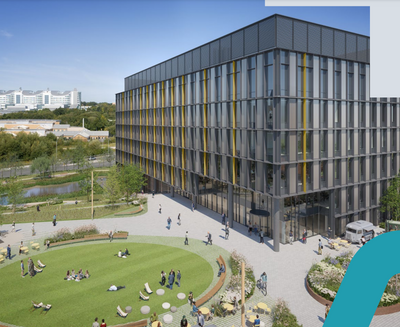Empowering the West Midlands to thrive as a vibrant life sciences ecosystem

Explore the groundbreaking developments in the UK's life sciences sector with Gino Martini, CEO of Precision Health Technologies Accelerator (PHTA) at Birmingham Health Innovation Campus. In this blog, Gino highlights Birmingham's role in addressing the critical need for laboratory and research spaces, positioning the West Midlands as a global hub for innovation and economic growth.
Lab space shortage in the UK
Following COVID-19, the UK’s life sciences sector has faced a number of challenges – of which one of the more significant has been the lack of laboratory and research space for life sciences entrepreneurs to move into. As testing as this has been for the sector, it also presents opportunities for the UK’s regions.
To illustrate the scale of the problem, there’s estimated to be 1.19m sq ft (110,00 sq m) of lab space in Cambridge – but the vast majority is already occupied, with only 7,000 sq ft available to new businesses. The story is similar in Oxford, where life sciences businesses are creating a demand for 850,000 sq ft of lab space against availability of just 25,000 sq ft which is ready to be occupied. Birmingham can not only help to ease these logistical pressures but also connect companies to a world-class regional R&D infrastructure – going beyond providing bench space and opening the door to a thriving life sciences and medtech ecosystem.
Developed in partnership between the University of Birmingham and experienced investor-developers Bruntwood SciTech, Birmingham Health Innovation Campus (BHIC) will provide 657,000 sq ft of state-of-the-art lab, office and incubation space making it the largest science park of its kind to be co-located with a leading redbrick University and major research and teaching NHS Trusts - as well as being the only science park in the Midlands region dedicated to health and life sciences.
PHTA is designed to accommodate spin-out companies and beyond – providing small health innovation businesses with much-needed grow-on space. Its facilities have been designed to suit the requirements of international investors and corporations as well as start-ups and scale-ups alike, and the scope for sustained growth is almost limitless: the wider ten-year master plan for BHIC will provide opportunities for bespoke facilities in forthcoming buildings. Overall, the development is set to create over 10,000 new jobs and contribute £400 million GVA to the regional economy by 2031.
West Midlands: a hub for health research
Uniquely, PHTA and BHIC are also able to draw on the academic and clinical expertise (as well as wider specialist facilities and capabilities) of the Birmingham Health Partners (BHP) ecosystem. This strategic alliance sees eight University and NHS members collaborate to deliver groundbreaking translational research, world-class education and training, and the highest quality patient care. BHP delivers national and international leadership in key areas of healthcare innovation, including:
- Development and delivery of complex clinical trials;
- Complex diagnostics, multi-omics analysis and health data;
- Medical device and diagnostics development, evaluation and testing; and
- Regulatory science and innovation.
The West Midlands offers extraordinarily fertile ground for nurturing health research ventures looking for affordable locations to grow. The region is one of the most dynamic, data-driven healthcare and medtech economies in the UK, worth £10.3 billion and employing over 17,000 professionals. It has a stable, non-transient, diverse population of more than 5 million people, of whom over 1 million are children, and is home to PIONEER, a longitudinal database providing the complete record of a patient’s healthcare journey dating back more than 20 years, available for research and innovation.
Government recognition
The UK Government is also seeking to harness the UK’s world-class R&D infrastructure as a vehicle for Levelling-Up regions and driving economic growth. BHIC represents a transformative investment in the West Midlands which feeds directly into this ambition. As part of BHIC, PHTA will act as a catalyst and a home for collaborative interactions between academics, entrepreneurs and clinicians with complementary skill sets, who can come together to accelerate innovations in a way that cannot be done when the talent and experience do not coexist under one roof. The result will be innovative new diagnostic tools, health technologies and medical devices which can reach patients faster, improving the lives of people in the city of Birmingham and far beyond.
Importantly, PHTA isn’t a refurbishment or repurposing of existing facilities. It has been custom-designed in consultation with key opinion leaders in a multitude of scientific fields and its existing base of industry partners. Catalysing economic growth is very much the intention.
Ambition is not lacking in Birmingham, and it has been recognised by Government too. In 2020, the ecosystem was awarded ‘Life Sciences Opportunity Zone’ status by the then Department for Business, Energy and Industrial Strategy. One of only six sites to receive this designation, Birmingham and BHIC was recognised by the UK Government for its world-class research infrastructure which brings together academics from the University of Birmingham, clinicians from major research and teaching NHS Trusts, and industry.
As the UK Government seeks to leverage our scientific prowess to boost economic growth, there is a national responsibility to provide cross-sector impetus and funding to laboratory and collaborative space for our scientific ventures to succeed. Not only will PHTA and BHIC put the West Midlands on the map as a hub for life sciences and healthcare research, but will attract that much-needed foreign investment to secure our reputation as a global science superpower. My hope and ambition is to make this a reality.
Please email [email protected] for further information.





